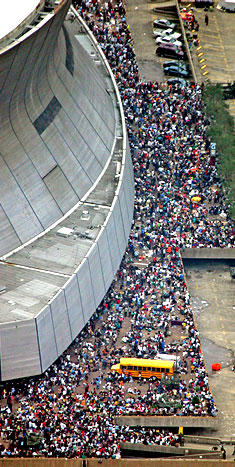
UNITED NATIONS (FinalCall.com) – A year after Hurricane Katrina, human rights activists are demanding that the international community take up the issue of how the people in New Orleans and the Delta communities may have had their rights violated in view of certain international conventions.
In July, a group of activists attended a session sponsored by the United Nations Human Rights Committee (UNHRC) in Geneva, Switzerland, when nations came together to discuss their human rights records.
A story subsequently appeared in several U.S. newspapers that the UNHRC had taken the Bush administration to task over Hurricane Katrina. “The United States must better protect poor people and African Americans in natural disasters to avoid problems like those after Hurricane Katrina,” the panel stated.
The UNHRC said poor and Black Americans were “disadvantaged” after Katrina, and the U.S. should work harder to ensure that their rights “are fully taken into consideration in the reconstruction plans with regard to access to housing, education and health care.”
“Being at that session of the Human Rights Committee was an eye-opener for me,” insists Reverend Daniel Buford of the Oakland-based Peoples Institute West, a subsidiary of the Peoples Institute for Survival & Beyond, which is based in New Orleans. “The committee also showed that they were not willing to sit for half-answers from the U.S. delegation,” Rev. Buford added. He said that the panel had 16 questions for the U.S. to address concerning discrimination experienced by Blacks during the New Orleans evacuation.
The Bush administration had been forced to send a high-level delegation to the session, with representatives from the State Department, Homeland Security, Department of Defense and the Justice Department. The U.S. was under a lot of pressure to explain its torture activities at Guantanamo Bay and at Iraq’s Abu Ghraib prison.
They weren’t expecting the issue of Hurricane Katrina to be as prominent in the minds of the committee as it was, states Ajamu Baraka, of the Atlanta-based U.S. Human Rights Network. “We were in Geneva in large numbers this time, and we were there to be heard,” admitted Mr. Baraka.
He said that his group, which attended the Geneva session under the umbrella of the Meiklejohn Civil Liberties Institute, presented the committee with a 465-page ‘shadow report’ that described how the human rights of the hurricane victims were violated under such international laws as the UN Covenant on Civil and Political Rights, a treaty ratified by the U.S. in the 1990s.
According to Mr. Baraka, the U.S. was also charged with violating the Convention on Elimination of Racial Discrimination and the Convention Against Torture and other Cruel, Inhuman or Degrading Treatment or Punishment.
“We organized a so-called victims panel in Geneva, with people such as Reverend Lois DeJean, a New Orleans minister; and Monique Harden of the Environmental Advocates for Human Rights testifying to what happened after the hurricane hit,” Mr. Baraka informed.
The issue of Hurricane Katrina also made a profound impression on other international participants such as the Cuban delegate, Rodrigo Malmierca Diaz, who stated during the United Nations General Assembly debate in March on formulating the new Human Rights Council: “The United States has no moral basis to blame any other country for anything, on the basis of its human rights record. What lessons could be learned on the promotion and protection of human rights by those who left thousands of their own nationals vulnerable when Hurricane Katrina devastated Louisiana.”
In May, Cuba’s Minister of Foreign Affairs Felipe Perez Roque said the U.S. was suffering a moral punishment for its imperial arrogance. “While under the striking force of Hurricane Katrina,” Mr. Roque observed, “the U.S. government abandoned hundreds of thousands of people to their luck, most of them Black and poor.”
He said that the Cuban delegation, which won a seat on the new council, will speak out for the rights of the American people and, particularly, the rights of its most discriminated and excluded sectors.
Our movement to move the debate around Katrina to the international arena has gained momentum, Mr. Baraka said proudly. “We are engaged in an ongoing campaign for social justice. “It’s about struggle.”
When asked by The Final Call how international law would help the more than 60,000 people from New Orleans, who may lose their homes to eminent domain, he answered, “We figured that out after the first three days of the evacuation process.”
He explained that there is a guiding UN principle on dealing with internally displaced people. “The government moved people from New Orleans to places like New York and Seattle, Wash., and they have a responsibility under international law to return them to their homes,” he argued, adding, “it’s the government’s primary responsibility to provide the conditions for the peoples’ right of return, and we are going to New York in September to tell the UN General Assembly just that.”












